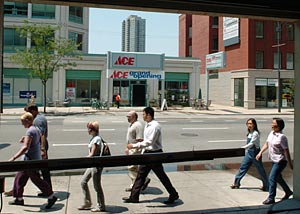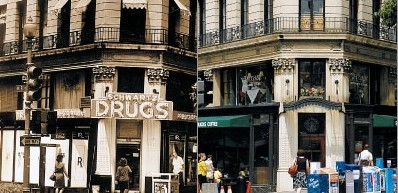Dupont Circle's changing retail environment covered in today's Post
Today's Post has a big feature on the chaining up of Dupont Circle. It just so happens that I wrote a long piece about this in January, in the Intowner, the community newspaper for mid-city Washington. That article, "Disappearing Small Businesses Here & Elsewhere," is available in the back issues archive on the Intowner website.
The Post story, "Life Around Dupont Circle Takes a New Turn," almost gets it, but not quite. Besides the change in geographical scale of the retail industry from one that was local to a now national and international industry of chains and brands, and the concomitant physical increase in the size of stores, there are two other significant changes:
1. At least in certain "neighborhood" commercial districts in the city, the real estate industry too has shifted from a local industry to one with national and international players; and
2. Property tax assessment methodologies used by the City of Washington don't treat neighborhood commercial properties any different from commercial properties downtown--over time that leads to an inexorable increase in property values which prices out independent businesses.
As long as properties are held locally, or by the owners of businesses, some of these trends can be staved off for awhile, but until the property tax assessment methodology is changed, this trend will continue.
There is nothing wrong with chain retail complementing independently retail. As pointed out in the article, "Some local merchants concede that the chain stores have increased foot traffic." And at the same time, they set a higher bar for marketing and merchandising, which encourages other businesses to improve as well.
But this statement pisses me off:
"If you want to get frustrated at the local guy not wanting to pay the rent, get frustrated at him not being able to get his act together and compete," said Bill Miller, a senior vice president at Transwestern Commercial Services, a realty firm.
Mr. Miller is being deliberately disingenuous. Chain retail benefits from a wide variety of sweeteners from vendors that independents do not have access to.
For example, Ann Taylor Loft likely negotiates financial givebacks from clothing manufacturers, when items are discounted. Manufacturers don't like doing this, but given the market power possessed by Ann Taylor, they have to give in.
No independent store has this kind of market power.
There are other advantages possessed by chains, and the property owners who rent to them. For example, a lease to a chain store can be "factored" or be loaned "against" by a bank, whereas this isn't the case for an independent store.
Plus, there is a fine line between adding retail options, mostly for residents, and homogenizing the retail offer in the city.
The fact is, visitors look for city retail options to skew to independents, because they want to find stores and products that are different from the options they have at home. The more the city homogenizes its retail offer, the greater the likelihood that the "benefit" from sales to visiting shoppers will be reduced.
Furthermore, retail oriented to tourists tends to be stultified and often limited (except for that oriented to high rollers such as in places like Las Vegas and now Atlantic City).
The proposed property tax legislation discussed in the article has real flaws, and would likely apply to under one dozen DC businesses.
The issue is, as I said in the article, to create "more intricate responses, at higher levels than a neighborhood."
I will say one thing about the article though. Neil Conway, the owner of District Hardware, who says he isn't interested in an underground location, is probably making a mistake. As you may have noticed this weekend, I mentioned Fusek's Hardware in downtown Indianapolis, which is an above-ground location.
 Since Gordon's Ace, at 440 N. Orleans, Chicago, opened in the spring, owners Les and Jeremy Melnick say business has exceeded expectations. (RICH HEIN/ SUN-TIMES).
Since Gordon's Ace, at 440 N. Orleans, Chicago, opened in the spring, owners Les and Jeremy Melnick say business has exceeded expectations. (RICH HEIN/ SUN-TIMES).But Gordon's Ace Hardware, which opened last year in downtown Chicago, has an above-ground entrance, but an underground store, and it is very successful. See this article "Heading Downtown: Retailers take a new look at Urban Markets," from the National Retail Hardware Association, as well as "Hardware store fills niche," from the Chicago Sun Times.
And as an article (not available online for free) in Home Channel News, "Basement Bet," discusses the success of the store as well:
When Jeremy Melnick first considered putting his family's new Ace Hardware store in the basement of a seven-story office building in downtown Chicago, he had reservations. Would shoppers realize the store was there? Would they be put off by the idea of shopping in a basement?
Amid those concerns, however, was one big positive: The basement offered 12,000 square feet of retail space - something almost unheard of in today's cramped urban markets where the typical hardware store occupies 3,000 to 5,000 square feet. There was also significant demand expected from customers associated with the area's boom in condos and loft conversions.
_________
For more on the general topic of commercial district "gentrification" see:
-- Is there a link between historic designation and chaining up of retail in neighborhood commercial districts?;
-- (Why aren't people) Learning from Jane Jacobs revisited;
-- Clarendon (Arlington Virginia);
-- Forcing Displacement by the disconnection of tax assessment models from public policy goals; -- Testimony -- Historic Neighborhood Retail Business Property Tax Relief Act;
-- (and this shorter sum up) Globalization of the DC real estate market catches neighborhood commercial districts up in the wake.
 Schwartz Drugs is now a Starbucks, Dupont Circle. Washington Post image.
Schwartz Drugs is now a Starbucks, Dupont Circle. Washington Post image.Watching the changes in Dupont Circle over the almost two decades that I have lived here has sensitized me to the issues, especially the conversion of Schwartz Drug Store (as mentioned in the Post article), back in 1993, which got me thinking about this issue, although then I was thinking more about "commercial rent control" or property tax abatements to help ensure the continued available of sundry products needed by residents, but priced out by restaurants and retail chains.
Index Keywords: urban-revitalization



0 Comments:
Post a Comment
<< Home